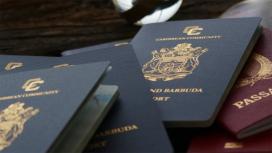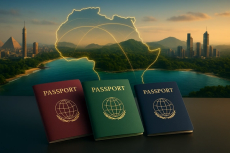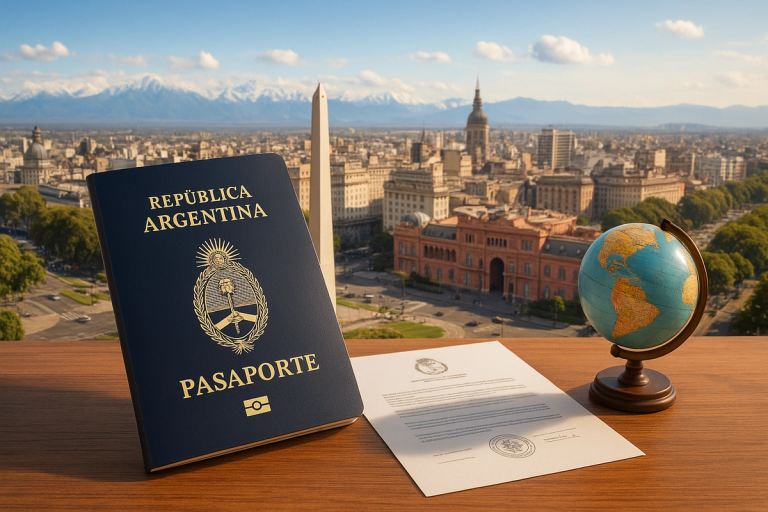Blog • Published on:September 15, 2025 | Updated on:September 18, 2025 • 11 Min
How to Apply for Argentina Citizenship in 2025
Argentina offers one of the most accessible citizenship frameworks in Latin America. With options through descent, marriage, or naturalization after just two years of residency, it remains a country where nationality is within reach for many foreign residents and their families.
In 2025, Argentina added a new layer to this system with the approval of a Citizenship by Investment program, an economic pathway that will sit alongside the traditional routes once fully implemented.
This guide breaks down every available option, the benefits of becoming an Argentine citizen, the requirements you need to meet, and what the process looks like in practice today.
Overview of Argentina Citizenship Options
Argentina provides distinct routes to nationality; each designed for different circumstances. The two main pathways are:
- Citizenship by Investment – Argentina’s newly approved 2025 program lets qualified foreign investors obtain direct Argentina citizenship and a second passport with no prior residence required. By making a significant, government-approved investment ($500,000), applicants can go straight to citizenship after routine due-diligence checks.
- Naturalization – available after two years of continuous residence in the country. This is one of the shortest residency requirements in the region.
- Descent – open to individuals with at least one Argentine parent. This is often the fastest option, as residency is not required.
- Argentina processes thousands of naturalization cases annually, particularly in Buenos Aires, where most applications are filed.
Compared with neighbours like Brazil (which requires four years of residence) or Chile (five years), Argentina’s timeline is among the most favourable in South America.
Benefits of Getting Argentine Citizenship
Passport Advantages and Visa-Free Travel
The Argentine passport is consistently ranked among the strongest in Latin America. As of 2025, it provides visa-free,visa-on-arrival, and eVisa access to 178 countries, including the Schengen Area, the UK, Japan, and Latin America.
Argentina is also pushing to rejoin the US Visa Waiver Program, which, if approved, would allow citizens to enter the United States without a visa.
Economic and Business Benefits
Citizenship opens the door to full participation in Argentina’s economy. Nationals have unrestricted rights to own property, invest in businesses, and access financial markets.
Argentina is also a member of MERCOSUR, meaning its citizens benefit from preferential trade and residency rights across member states like Brazil, Uruguay, and Paraguay.
Social Benefits and Rights
Argentinian citizens gain access to the country’s universal healthcare system and free public education, including universities.
They also hold the right to vote, run for office, and work in all professions without restrictions. Citizenship also secures legal permanence, unlike residency permits, it cannot be revoked due to prolonged absence abroad.
Argentina’s New Citizenship by Investment Program
In July 2025, Argentina officially created a new pathway to citizenship through investment via Decree 524/2025.
This marks a big change: foreign nationals who make a qualifying investment will be able to apply for Argentine citizenship without meeting the standard residency requirement.
Key Features Confirmed to Date
- Legal Framework: The program is established under Decree 524/2025, which amends existing legislation (Law 346 / Citizenship Law) and creates a specific Agency for Citizenship by Investment under the Ministry of Economy.
- No Residency Requirement: Applicants do not need to have lived in Argentina for any set period prior to applying under this route. Residency is effectively waived for those qualifying via investment.
- Decision-Timeline: Once the application and investment are approved (and background checks done), the National Directorate of Migration must issue a decision within 30 business days.
- Oversight & Due Diligence: Multiple government agencies will be involved in vetting applicants. These include: the Financial Intelligence Unit (UIF), RENAPER (National Registry of Persons), the State Intelligence Secretariat, the National Registry of Recidivism, Ministry of Security, etc.
- Tax ID (CUIT): After citizenship is granted via investment, individuals will be issued a tax identification number (CUIT), necessary for formal economic activity in Argentina.
Pending Regulations
- Minimum Investment Amount: There is no officially published, confirmed figure yet. Several sources anticipate something around $500,000, but that remains tentative
- What Counts as a “Relevant” or “Qualifying” Investment: The decree lets the Ministry of Economy define which sectors or types of investments qualify. Early reports suggest “strategic” or “productive” sectors (technology, renewable energy, infrastructure, agriculture, tourism), but criteria are not yet fixed. Passive real estate alone seems unlikely to qualify unless tied to an active project.
- When Applications Can Actually Begin: Although the legal framework is in force, the program is not yet fully operational. The implementing regulations, operational agency procedures, and system integrations still need to be completed before applications open. Some sources expect the rollout in late 2025 or early 2026.
Implications and Who Might Benefit
- This program is designed for HNWIs or investors interested in making a meaningful economic contribution.
- It provides a way to secure citizenship more directly, bypassing the usual time-in-country requirement, which is a major advantage.
- Because of the oversight and background checks, applicants must have clean legal/financial standing, clearly documented source of funds, etc.
Argentina Citizenship by Naturalization
Residency Requirements
Argentina stands out for its short timeline: foreigners can apply for naturalization after just two years of continuous legal residence.
This is significantly lower than in most countries, where the requirement is usually five to ten years. Residency must be legal and documented, meaning applicants must hold a valid residence permit during this period.
Language Proficiency
Applicants are expected to demonstrate basic proficiency in Spanish. While there is no formal language exam, courts often verify an applicant’s ability to communicate effectively in everyday contexts.
Documentation Needed
Typical documents include:
- Valid residence permit and DNI (Argentine ID card)
- Birth certificate (apostilled and translated if issued abroad)
- Proof of continuous residence (utility bills, rental contracts, or work records)
- Clean criminal record certificates from both Argentina and the applicant’s country of origin
- Evidence of integration, such as employment, studies, or family ties in Argentina
Processing Times
Once submitted to the National Court, naturalization cases generally take 12–24 months to be processed, though timelines can vary by jurisdiction.
Buenos Aires courts often see the highest volume of applications, leading to longer wait times compared to provincial courts.
Argentina Citizenship by Descent
Eligibility Requirements
Citizenship by descent is one of the most straightforward options. Anyone with at least one Argentinian parent is automatically eligible, regardless of place of birth.
Required Documents
Applicants need to provide:
- Birth certificates of the applicant and the Argentine parent Marriage certificates of parents or grandparents, if applicable
- Proof of the parent’s Argentinian citizenship (such as DNI or Argentine passport)
- Apostilled and officially translated foreign documents
Application Process
Applications can be filed at an Argentine civil registry inside the country or at an Argentine consulate abroad.
Once verified, descent-based citizenship is typically recognized without residency requirements. Processing times vary but often range from a few months to a year, depending on the location and completeness of the documents.
Legal Requirements for Argentine Citizenship
Criminal Record Requirements
Applicants must provide a clean criminal record from both Argentina and their country of origin. Courts review any history of convictions carefully.
Minor infractions may not automatically disqualify an applicant, but serious or unresolved cases can lead to denial.
Financial Requirements
Unlike some countries, Argentina does not impose strict income thresholds for citizenship.
However, applicants must show they have stable means of support, such as employment, self-employment, pensions, or savings. This helps demonstrate integration and reduces the risk of rejection.
Integration Requirements
Judges often look for signs that an applicant has genuinely integrated into Argentine society. Evidence may include:
- Spanish language proficiency
- Work contracts or business activity
- Proof of residence and tax compliance
- Family or community ties in Argentina
While these requirements are not always formally codified, integration is a recurring factor in naturalization decisions.
Step-by-Step Application Process
Initial Documentation
The process begins with gathering and preparing the required documents. Most foreign documents must be apostilled and translated into Spanish by a certified translator in Argentina.
Common paperwork includes birth certificates, proof of residence, criminal record certificates, and financial evidence.
Application Submission
Applications for citizenship are filed before a federal court in the applicant’s place of residence.
The court reviews the file to ensure all requirements are met and then initiates the evaluation process.
Interview Process
Applicants are usually invited to an interview or hearing with a judge. This step is designed to confirm the applicant’s integration into Argentine society, language ability, and commitment to reside (or maintain ties) in the country. Questions may cover work, family life, and daily experiences in Argentina.
Oath Ceremony
If the application is approved, the applicant is invited to attend an oath of allegiance ceremony before the court.
At this point, citizenship is officially granted, and the applicant can request an Argentine DNI (identity card) and passport.
Living in Argentina Requirements
Permanent Residency Options
For those applying through naturalization, holding a valid temporary or permanent residence permit is essential.
Common routes include work visas, student visas, investor visas, or family reunification permits. After two years, residents become eligible to file for citizenship.
Proof of Income
While Argentina does not impose strict income thresholds for citizenship, applicants are expected to demonstrate sufficient means to support themselves.
This could be through employment contracts, proof of self-employment, pension statements, or savings. Consistency and legality of income sources are key.
Housing Requirements
There is no formal rule requiring property ownership. However, courts often request proof of residence, such as a rental contract, utility bills, or property deed, to confirm continuous presence in Argentina.
This strengthens the application by showing the applicant is genuinely settled in the country.
Dual Citizenship Considerations
Countries Allowing Dual Citizenship
Argentina officially recognizes and allows dual or multiple citizenships. This means applicants do not need to renounce their original nationality to become Argentine.
Whether you can legally hold both depends on your home country’s rules, for example, citizens of Canada, most EU states, and many Latin American countries can retain both, while some Asian and Middle Eastern countries restrict dual nationality.
Tax Implications
Argentine citizens are considered tax residents if they spend more than 183 days per year in the country or establish their main economic interests there.
Citizenship alone does not automatically trigger tax residency, but many new nationals choose to remain mindful of the 183-day rule.
Argentina has double taxation treaties with several countries, which can help reduce exposure.
Military Service Requirements
Argentina abolished compulsory military service in 1995. Today, service is voluntary, so obtaining citizenship does not create any military obligations.
Cost and Timeline Analysis
Government Fees
Government filing fees for citizenship applications in Argentina are relatively low compared to other countries.
Court-related charges and document registration costs are usually modest, though applicants should also budget for translations and apostilles of foreign documents.
Legal Assistance Costs
Many applicants choose to work with an immigration lawyer or consultant, especially in Buenos Aires where case volumes are high.
Professional fees can vary widely but generally range from$1,500–5,000, depending on the complexity of the case and whether appeals or additional filings are needed.
Processing Timeframes
- Naturalization cases typically take 12–24 months once submitted to court
- Descent cases are often faster, averaging a few months to a year depending on where the application is filed
- The new investment route (approved in 2025) is expected to have a shorter decision window of about 30 business days once the regulations are finalized and applications open
Common Challenges and Solutions
Documentation Issues
Many applications are delayed because foreign documents are not properly apostilled, legalized, or translated into Spanish.
The solution is to prepare documentation early and use certified translators recognized by Argentine courts.
Language Barriers
Even though the language requirement is not formalized into a strict exam, applicants must show basic Spanish ability during interviews or hearings.
Taking language classes and practicing conversational Spanish greatly improves the chances of a smooth process.
Administrative Delays
Argentina’s judicial system can be slow, especially in Buenos Aires where most applications are filed.
Choosing to apply in a provincial court with lighter caseloads can shorten processing times.
Working with an experienced lawyer also helps avoid unnecessary back-and-forth with missing documents.
FAQs on Argentine Citizenship
1. How long does it take to get Argentine citizenship through naturalization?
You can apply after just two years of continuous residence, one of the shortest timelines in Latin America. Once filed, cases typically take 12–24 months to be decided in court.
2. Can I keep my original nationality if I become an Argentine citizen?
Yes. Argentina recognizes dual citizenship, so you do not need to give up your existing passport, though you must also check if your home country allows dual nationality.
3. What documents are required for the citizenship application?
Key documents include: birth certificate, proof of residence in Argentina, criminal record certificates (local and foreign), DNI or residence permit, and financial evidence. All foreign documents must be apostilled and translated into Spanish.
4. Is Spanish language knowledge required?
Yes, applicants must demonstrate basic Spanish proficiency. There is no standardized test, but judges usually assess this during interviews or hearings.
5. Does Argentina now offer citizenship by investment?
Yes. In 2025, Argentina approved a Citizenship by Investment program. While the framework is in place, final rules (such as minimum investment amount and eligible sectors) are still pending. Once launched, it will allow investors to apply without meeting residency requirements.
References
Government of Argentina. (2025). Decreto 524/2025: Ciudadanía por Inversión. Boletín Oficial de la República Argentina.
Referred from: https://www.boletinoficial.gob.ar
KPMG International. (2025). Argentina – New Citizenship by Investment Program Introduced (GMS Flash Alert 2025-144). KPMG Global Mobility Services.
Referred from: https://kpmg.com/xx/en/our-insights/gms-flash-alert/flash-alert-2025-144.html
European University Institute. (2023). Global Database on Modes of Acquisition of Citizenship: Argentina. EUDO Citizenship Observatory.
Referred from: https://globalcit.eu
International Monetary Fund. (2025). Argentina – Staff Report for the 2025 Article IV Consultation. Washington, DC: IMF.
Referred from: https://www.imf.org/en/Publications
United Nations High Commissioner for Refugees (UNHCR). (2024). Nationality and Statelessness: Argentina Country Report. Geneva: UNHCR.
Referred from: https://www.unhcr.org
Written By

João Silva
João Silva is a seasoned consultant in the global mobility industry with over 12 years of experience. Specializing in European residency and citizenship by investment programs, João has assisted hundreds of high-net-worth clients in securing their second citizenship through strategic investments in real estate and government bonds.
Related Articles









Recently Published









Book a free consultation


